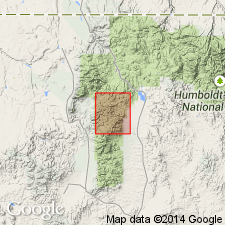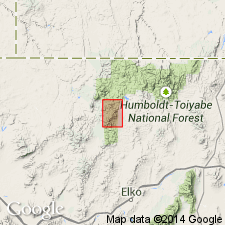
- Usage in publication:
-
- Ott Creek Member
- Modifications:
-
- Named
- Dominant lithology:
-
- Chert
- Limestone
- AAPG geologic province:
-
- Great Basin province
Summary:
Named as 3rd from uppermost member (of 8 named members) of Schoonover Formation (new). Exposed on slopes and ridges immediately south of Ott Creek, northern Independence Mountains, Bull Run and Wildhorse quads, Elko Co, NV, where shown on geologic map of portions of quads. Consists of alternating chert and limestone units. Estimated maximum thickness is 1600 ft. Overlies Cap Winn Member; underlies Frost Creek Member (both new and of Schoonover Formation). Is Mississippian age.
Source: GNU records (USGS DDS-6; Menlo GNULEX).

- Usage in publication:
-
- Ott Creek Member
- Modifications:
-
- Age modified
- AAPG geologic province:
-
- Great Basin province
Summary:
Sample of radiolarian chert collected from Ott Creek Member of Schoonover Formation at 41 deg 34.2'N, 116 deg 0.94'W, Bull Run 15' quad, Elko Co, NV, was found to be Early Pennsylvanian age. This sample is from "structurally higher chert" [of Schoonover sequence] interbedded with silty limestone turbidites.
Source: GNU records (USGS DDS-6; Menlo GNULEX).
For more information, please contact Nancy Stamm, Geologic Names Committee Secretary.
Asterisk (*) indicates published by U.S. Geological Survey authors.
"No current usage" (†) implies that a name has been abandoned or has fallen into disuse. Former usage and, if known, replacement name given in parentheses ( ).
Slash (/) indicates name conflicts with nomenclatural guidelines (CSN, 1933; ACSN, 1961, 1970; NACSN, 1983, 2005, 2021). May be explained within brackets ([ ]).

